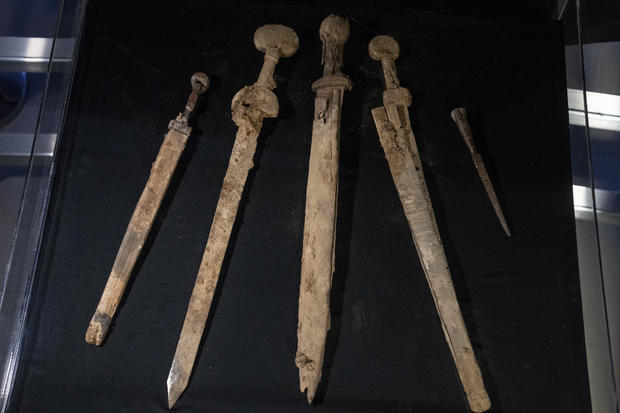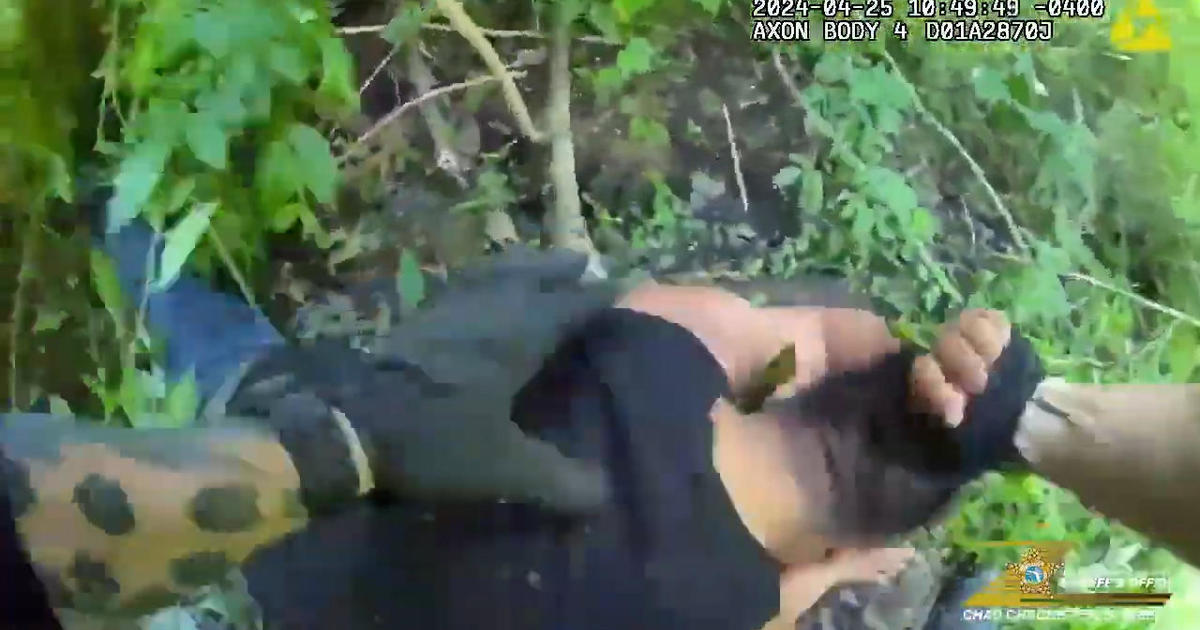4 Roman-era swords discovered after 1,900 years in Dead Sea cave: "Almost in mint condition"
Four Roman-era swords, their wooden and leather hilts and scabbards and steel blades exquisitely preserved after 1,900 years in a desert cave, surfaced in a recent excavation by Israeli archaeologists near the Dead Sea, the Israel Antiquities Authority announced Wednesday.
The cache of exceptionally intact artifacts was found about two months ago and tells a story of empire and rebellion, of long-distance conquest and local insurrection. They were found in a near-inaccessible crevice by a team photographing an ancient inscription on a stalactite, the BBC reported.
"This is a dramatic and exciting discovery, touching on a specific moment in time," Eli Escusido, director of the Israel Antiquities Authority, said in a statement. "This is a unique time capsule, whereby fragments of scrolls, coins from the Jewish Revolt, leather sandals, and now even swords in their scabbards, sharp as if they had only just been hidden away today."
Researchers, who published the preliminary findings in a newly released book, propose that the arms — four swords and the head of a javelin, known as a pilum — were stashed in the remote cavern by Jewish rebels during an uprising against the Roman Empire in the 130s.
The swords were dated based on their typology, and have not yet undergone radiocarbon dating.
The find was part of the antiquities authority's Judean Desert Survey, which aims to document and excavate caves near the Dead Sea and secure scrolls and other precious artifacts before looters have a chance to plunder them.
The cool, arid and stable climate of the desert caves has allowed exceptional preservation of organic remains, including hundreds of ancient parchment fragments known as the Dead Sea Scrolls.
Those Jewish texts, discovered last century and dated to the first centuries BCE and CE, contain the earliest known versions of the Hebrew Bible, as well an assortment of esoteric writings. More fragments of the scrolls were uncovered as recently as 2021.
Archaeologists returned to this particular cave near the desert oasis of Ein Gedi to document an inscription found decades earlier.
"At the back of the cave, in one of the deepest part of it, inside a niche, I was able to retrieve that artifact - the Roman pilum head, which came out almost in mint condition," said Asaf Gayer, an archaeologist with Ariel University.
The researchers reported the discovery and then returned with another team to carry out a survey of all the crevices in the cave, when the four swords were uncovered, the BBC reported.
But though the swords were found on the eastern edge of the Roman Empire, they were likely crafted in a distant European province and brought to the province of Judaea by soldiers in the military, said Guy Stiebel, a Tel Aviv University archaeologist specializing in Roman military history.
He said the quality of their preservation was exceptionally rare for Roman weapons, with only a small handful of examples from elsewhere in the empire and beyond its borders.
"Each one of them can tell you an entire story," he said.
Future research will focus on studying its manufacture and the origin of the materials in order to tease out the history of the objects and the people it belonged to: Roman soldiers and Jewish rebels.
"They also reflect a much grander narrative of the entire Roman Empire and the fact that from a small cave in a very remote place on the edge of the empire, we can actually shed light about those mechanisms is the greatest joy that the scientist can have," he said.




